外研版选修7 Module 5 Ethnic Culture P4 Grammar分词作状语(共66张PPT)
文档属性
| 名称 | 外研版选修7 Module 5 Ethnic Culture P4 Grammar分词作状语(共66张PPT) |  | |
| 格式 | zip | ||
| 文件大小 | 5.7MB | ||
| 资源类型 | 教案 | ||
| 版本资源 | 外研版 | ||
| 科目 | 英语 | ||
| 更新时间 | 2015-03-08 16:26:59 | ||
图片预览

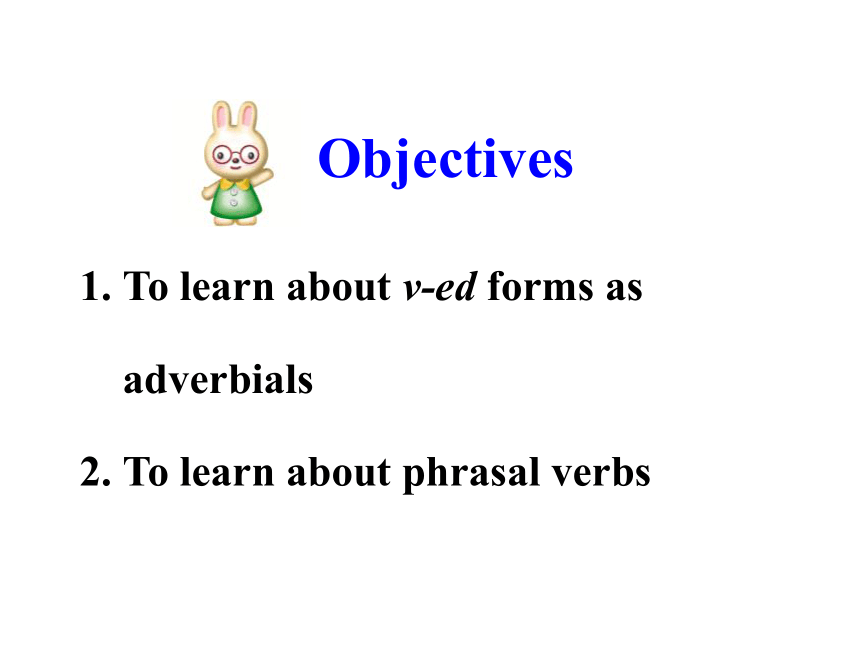
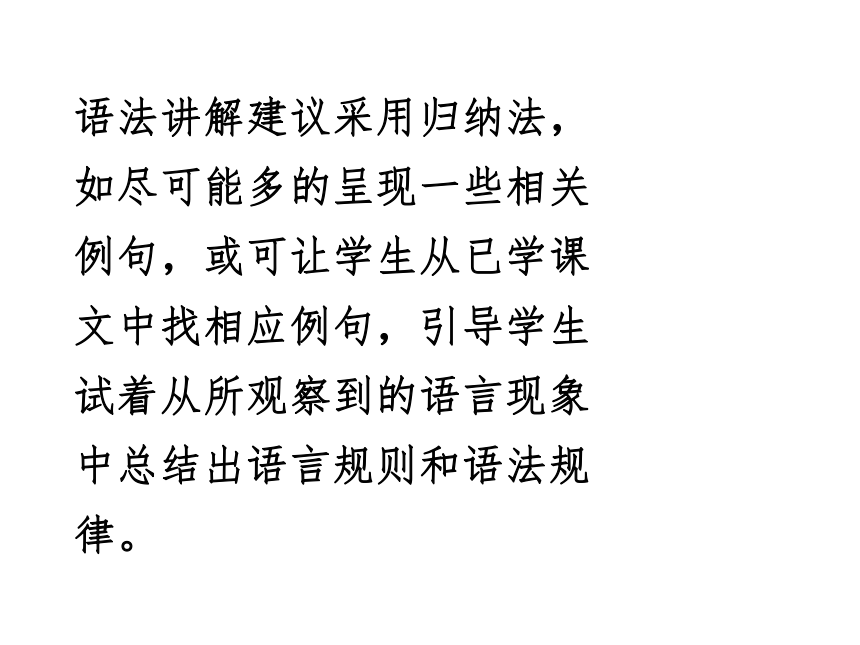
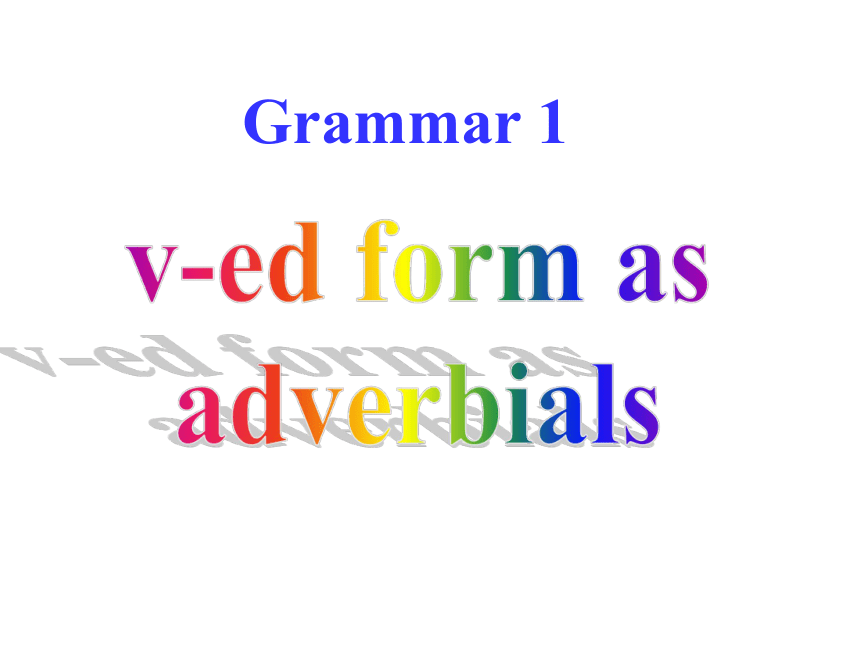
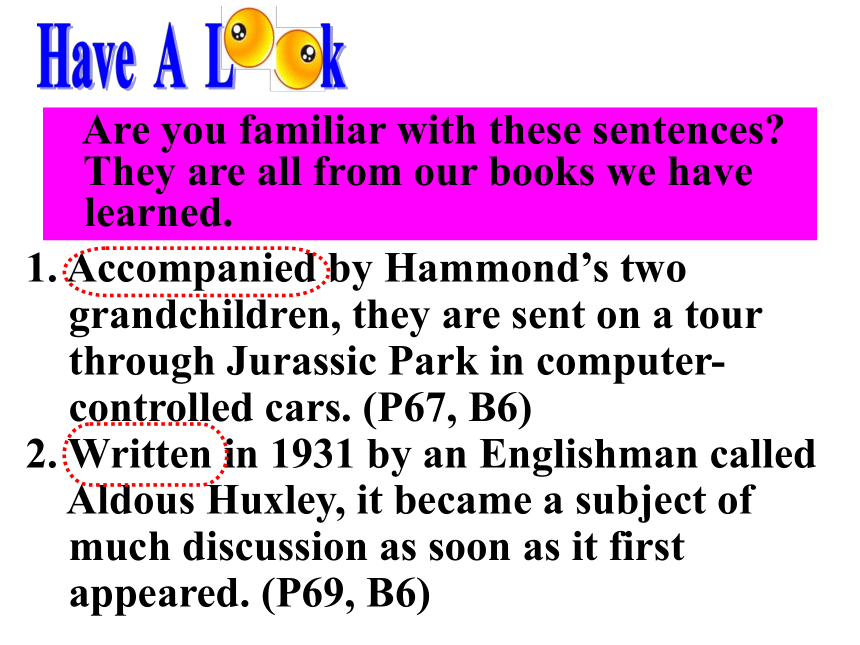
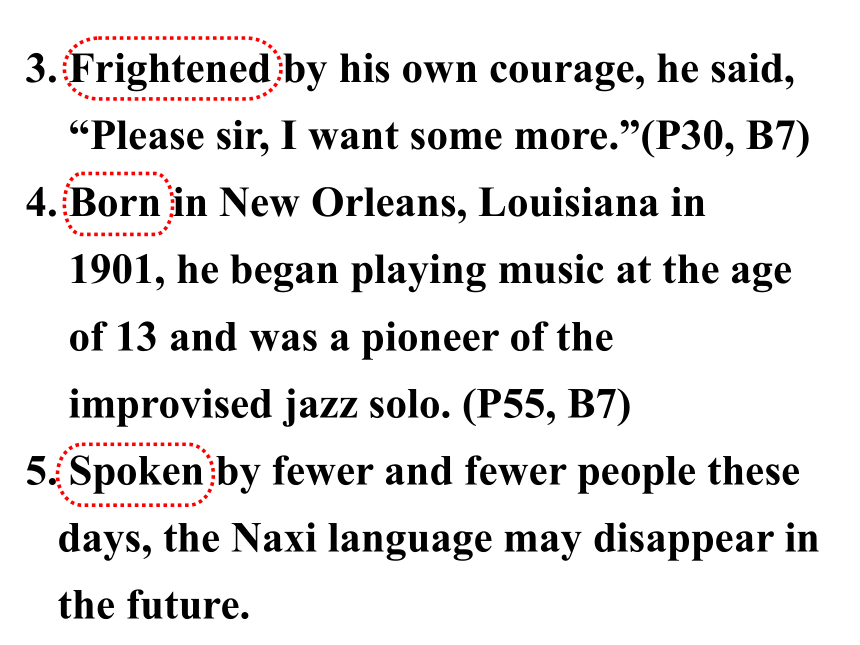


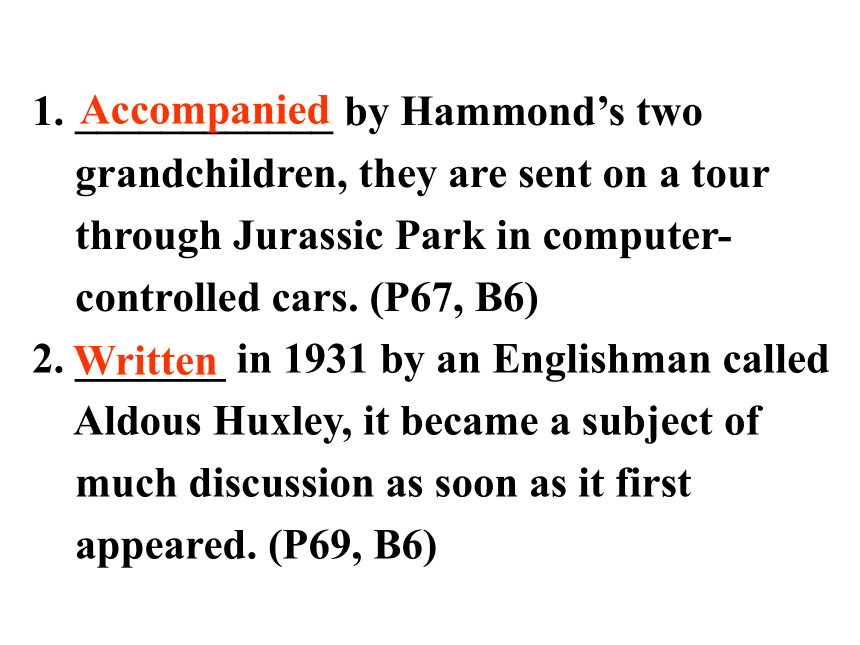
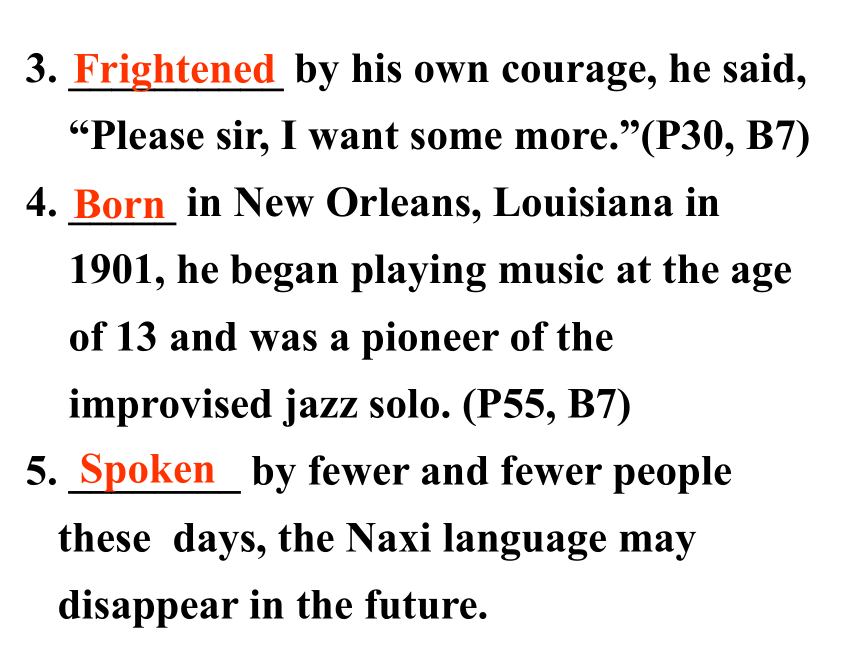
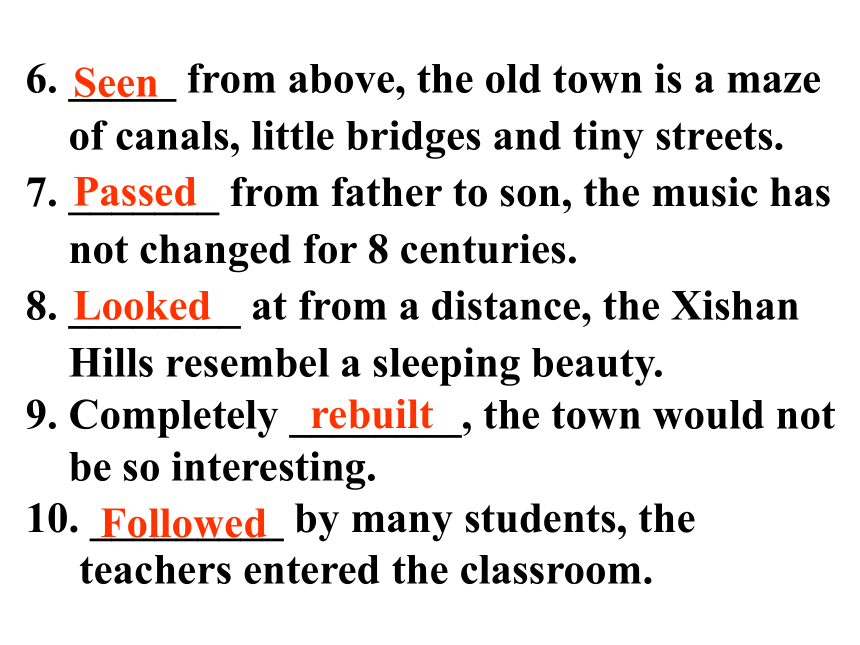
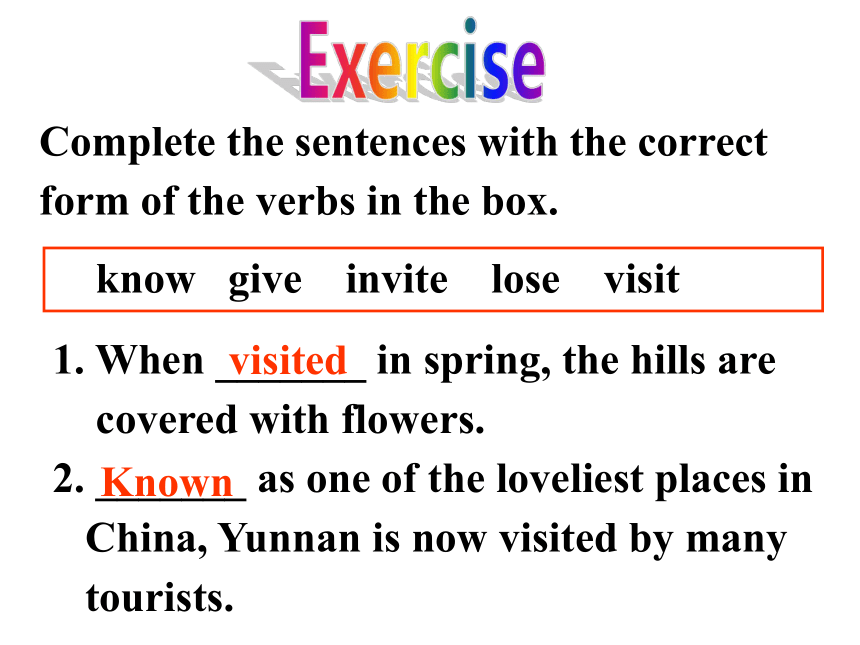
文档简介
课件66张PPT。 M5Ethnic CultureObjectivesTo learn about v-ed forms as adverbials
To learn about phrasal verbs语法讲解建议采用归纳法,如尽可能多的呈现一些相关例句,或可让学生从已学课文中找相应例句,引导学生试着从所观察到的语言现象中总结出语言规则和语法规律。Grammar 1v-ed form as
adverbials Accompanied by Hammond’s two
grandchildren, they are sent on a tour
through Jurassic Park in computer-
controlled cars. (P67, B6)
2. Written in 1931 by an Englishman called
Aldous Huxley, it became a subject of
much discussion as soon as it first
appeared. (P69, B6) Are you familiar with these sentences?
They are all from our books we have
learned. 3. Frightened by his own courage, he said,
“Please sir, I want some more.”(P30, B7)
4. Born in New Orleans, Louisiana in
1901, he began playing music at the age
of 13 and was a pioneer of the
improvised jazz solo. (P55, B7)
5. Spoken by fewer and fewer people these days, the Naxi language may disappear in the future.6. Seen from above, the old town is a maze
of canals, little bridges and tiny streets.
7. Passed from father to son, the music has
not changed for 8 centuries.
8. Looked at from a distance, the Xishan
Hills resembel a sleeping beauty.
9. Completely rebuilt, the town would not
be so interesting.
10. Followed by many students, the teachers
entered the classroom.to test your sense of observation
to test your ability of short-term memory
to test your ability to highlight the language pointsGuessGuessing Games ____________ by Hammond’s two
grandchildren, they are sent on a tour
through Jurassic Park in computer-
controlled cars. (P67, B6)
2. _______ in 1931 by an Englishman called
Aldous Huxley, it became a subject of
much discussion as soon as it first
appeared. (P69, B6)AccompaniedWritten3. __________ by his own courage, he said,
“Please sir, I want some more.”(P30, B7)
4. _____ in New Orleans, Louisiana in
1901, he began playing music at the age
of 13 and was a pioneer of the
improvised jazz solo. (P55, B7)
5. ________ by fewer and fewer people these days, the Naxi language may disappear in the future.FrightenedBornSpoken6. _____ from above, the old town is a maze
of canals, little bridges and tiny streets.
7. _______ from father to son, the music has
not changed for 8 centuries.
8. ________ at from a distance, the Xishan
Hills resembel a sleeping beauty.
9. Completely ________, the town would not
be so interesting.
10. _________ by many students, the
teachers entered the classroom.SeenPassedLookedrebuiltFollowedComplete the sentences with the correct form of the verbs in the box. know give invite lose visit When _______ in spring, the hills are
covered with flowers.
2. _______ as one of the loveliest places in China, Yunnan is now visited by many tourists.ExercisevisitedKnown3. ____ in the tiny streets, we decides
to ask for help.
4. _______ into a Naxi home, you should
accept with pleasure.
5. If ______ something you don’t want
to eat, just refuse politely.LostInvitedgiven以上我们已经通过归纳总结和练习对本课的语法内容有了一定的了解,下面就让我们根据
之前练习的考察情
况进一步选择讲解
该语法项的重难点。过去分词作状语是英语中常见的语言现象。我们所说的过去分词作状语是指单个的过去分词和过去分词短语这两种情况作状语。如frightened 是过去分词,frightened by the noise是过去分词短语。过去分词作状语
Seen from the top of the
building, our school looks beautiful.
从楼顶上看,学校看起来很美。
Water boils, heated to
100°C.
水加热到100度就沸腾。(When it is)(when it is)1. 作时间状语She walked out of the house,
followed by her little daughter.
她走出房间,后面跟着她的小女儿。
Absorbed in the work, he
neglected food and sleep.
他专心于工作,废寝忘食。(and she was) (He was) 2. 作伴随状语 Destroyed by the
hurricane, the old house is nowhere to
be found.
由于飓风的破坏,那座老房子哪也找不
到了。
Bitten by the cobra, the
man was in danger.
因为被眼镜蛇咬了,这人处在危险中。(As/Because it has been) (Because he was)3. 作原因状语 Tired, he went on working.
Punished by the parents, he won’t come again.(Although he was) (If he is)虽然他很疲倦,他仍然继续工作。他若是被家长惩罚了,就再也不能来了。4. 作让步、条件状语注意:在使用过去分词作状语时要特别注意过去分词的逻辑主语一定是句子的主语,其逻辑主语与过去分词的关系是被动关系。下面的例子就可以说明这个问题。同样conj+非谓语动词单独使用时,非谓动词的逻辑主语与句子的主语须相一致。If given enough time, we could have finished the work.If (we had been) given enough time, Hearing the sad news, tears ran down her cheeks. 正:When she heard/She hearing, … ____ from the top of the building, the school looks beautiful.
_____ from the top of the building, we found the school beautiful.Seen Seeing 从楼顶上看,学校看起来很美。我们从楼顶往下看,发现学校很美。这里第一句seen的逻辑主语是school,其关系 是被动关系;第二句seeing的逻辑主语是we,其关系是主动关系。 __________ (compare)Shanghai with Xi’an, we found Shanghai is large.
_________ (compare) with Xi’an, Shanghai is large.
______ (lose) himself in thought, he almost ran into the car in front of him.
____ (lose) in thought, he almost ran into the car in front of him. ComparingLosingLostCompared__________________ (not tell) ahead of time, he didn’t know the meeting was put off.
__________ (determine) to complete the job on time, they set out to work immediately.
_____________ (finish) their homework, the students went out.
____ (leave) alone in the dark room, the little boy was so frightened as to cry.Not having been toldDeterminedHaving finishedLeft我跑进教室,满脸是土。I rushed into the classroom, __________________ (cover) dust.my face covered with 过去分词短语单独作状语时,它的逻辑主语一般必须与句子的主语一致。但:我们从题意得知:cover一词的逻辑主语应为my face,与句子的主语 I 不一致,因此采用独立主格结构。各方面都考虑进去,你的文章比他的文章更有价值。__________________, your article is of greater value than his.All things considered但如果不一致,须采用独立主格结构:逻辑主语+ done。过去分词(或短语)作状语和状语从句的转换1) Seen from the hill top, the valley looks like a wonderland.=When/If the valley is seen from the hill top, it looks like a wonderland. 当/如果从上顶上望去,峡谷宛如仙境。 句中的过去分词短语可以转换成时间或条件状语从句。 由此可以断定此过去分词短语在句中作时间/条件状语。2) Once published, his work became famous for the absence of rhyme at the end of each line. =Once his work was published, his work became famous for the absence of rhyme at the end of each line. 他的作品一发表就以每一行结尾不押韵而出名。 Once his work was published…
引起一时间状语从句。 3) As soon as translated into English, the book became very popular in the Western World. =As soon as it was translated into English, the book became very popular in the Western World. 这本书一被翻译成英文,就在西方世界流行了起来。 As?soon as translated into English
在句中充当时间状语。4) Connected to the rest of the house by a long passage, the room seems very quiet. =As it is connected to the rest of the house by a long passage, the room seems very quiet. 由于这间房子由一道长廊与其他房间相连,它显得非常安静。Connected to the rest of the house by a long passage在句中充当原因状语。5) Although left alone at home, the little girl did not feel afraid at all. =Although she was left alone at home, the little girl did not feel afraid at all. 虽然小女孩一个人被留在家里,但她并不感到害怕。 Although left alone at home 在句中充当让步状语。Review复习过去分词作状语:
1. 作时间状语;
2. 作伴随状语;
3. 作原因状语;
4. 作让步、条件状语。注: word 文档
点击此处链接Individual activityDo you know why the US uses the bald eagle as its emblem (国徽)? In 1782, US Congress (美国国会) selected the bald eagle as the emblem of the newly ______ (form) United States, because it represents courage and might. What’s more, it _____ _______(find) only in the United States and Canada at that time. The national emblem shows the bald eagle with its wings spread,
with one claw holding an olive branch, and the other claw _________(grasp) arrows.根据提示或上下文语境,用本单元课文
中出现的生词、短语的适当形式填空,
完成短文。formedwasfoundgrasping1. Ladies and gentlemen, please remain _____ until the plane has come to a complete stop. (2009四川)
A. seated B. seating
C. to seat D. seat
2. _____ by the advances in technology, many farmers have set up wind farms on their land. (2009天津)
A. Being encouraged B. Encouraging
C. Encouraged D. Having encouraged实战高考3. ____ and short of breath, Andy and Ruby were the first to reach the top of Mount Tai. (2009 浙江)
A. To be tired B. Tired
C. Tiring D. Being tired
4. ____ twice, the postman refused to deliver our letters unless we chained our dog. (2009 北京)
A. Being bitten B. Bitten
C. Having bitten D. To be bitten 5. Michael’s new house is like a huge palace, ____ with his old one.
(2009 重庆)
A. comparing B. compares
C. to compare D. compared
6. Though ______ to see us, the
professor gave us a warm welcome.
(2010 全国II)
A. surprise B was surprised
C. surprised D. being surprised7. In April, thousands of holidaymakers
remained ____ abroad due to the
volcanic ash cloud. (2010 福建)
A. sticking B. stuck
C. to be stuck D. to have stuck
8. _____ from the top of the tower, the
south foot of the mountain is a sea of
trees. (2010 陕西)
A. Seen B. Seeing
C. Have seen D. To see9. The experiment shows that proper amounts of exercise, if ___ regularly, can improve our health. (2010 浙江)
A. being carried out B. carrying out
C. carried out D. to carry out
10. _____ an important role in a new
movie, Andy has a chance to
become famous. (2011 四川)
A. Offer B. Offering
C. Offered D. To offer11. Time, ________ correctly; is money
in the bank. (2012 湖南)
A. to use B. used C. using D. use
12. _______ with care, one tin will last
for six weeks. (2012 北京)
A. Use B. Using C. Used D. To use13. The club, ____ 25 years ago, is
holding a party for past and present
members. (2012 上海)
A. founded B. founding
C. being founded D. to be foundedGrammar 2Phrasal verbsgrow up, look back at, beg for, come out, try out, set off, wake up, run through, come from, bring with, come across, make up of, hear from, think overAll of these are called Phrasal Verbs.以上我们已经通过归纳总结和练习对本课的语法内容有了一定的了解,下面就让我们根据
之前练习的考察情
况进一步选择讲解
该语法项的重难点。一、什么是动词短语?
动词短语由动词加一个或两个小品词(particle)构成,如blow up, take off, look into, face up to等。
二、动词短语的分类
从形态构成来看,动词短语可以分成以下三种:Phrasal verbs(1)动词+副词
We can put the match off till next week.
我们可以将这场比赛推迟到下星期举行。
The travellers set off at dawn.
旅游者一清早就出发了。
(2)动词+介词
They are looking into the disappearance of the gold watch.
他们正在追查那只失踪的金表。
He has decided to run for President.
他决定参加总统竞选。(3)动词+副词+介词
He put in for a new job.
他提出要求担任一项新的工作。
They are thinking of putting him in for the new job.
他们想推荐他参加这项新工作。
注意此句动词和副词间插入了一个宾语。
He put the odd weather down to nuclear explosions.
他将天气反常归咎于核爆。
注意此句动词和副词间插入了一个宾语。三、动词短语语义的变化
★第一类,动词和小品词保持原意,词义可从两个成分的意义中引申出来。
bring forth=produce, call on=visit, get away=escape, get back=recover, hold up=obstruct, keep back=retain, look over=inspect等。
在这一类中,根据小品词的涵义,又可以分成三种组合类型:i. 小品词说明动词的方向,带有空间涵义。
The buds are coming out.
蓓蕾绽放。
The snow came down thick and fast.
大雪纷飞。
在这一组合类型中,小品词up除了说明
动词所指方向外,还可指“接近目标”。
He went straight up to the door.
他一直走到门口。ii. 小品词表示“完全、彻底”的意思。
After working all afternoon, they ate up all of the dinner.
工作了一个下午之后,他们在晚餐上把东西全吃光了。
He drank the beer off at a draught.
他把啤酒一饮而尽。iii. 小品词表示“持续下去或渐渐地淡薄、减弱”,多半以away来表示。
He’s been working away at this job since breakfast.
早饭后,他一直在干这项工作。
They were digging away in their garden.
他们正在花园里拼命地挖土。
The thunder and lightning died away in heavy rain.
雷声和闪电消逝,暴雨来临。★第二类,动词保持原意,小品词部分或全部丧失原意,词义尚能从其构词成分的意义中推断出来。
如find out = discover, give up = abandon, leave off=stop, work out=calculate等。
He was angry when they found out his secret.
当他们发现他的秘密时,他勃然大怒。
When do we break up for the Easter Holidays?
我们什么时候放假过复活节?★第三类,动词和小品词的意义都已改变,构成一个新的语义单位,语义不能从其构词成分的意义中引申出来。
如 come by=obtain, get by=manage, get up=prepare等。
How did you come by the dictionary?
这本词典你是怎样弄到手的?
He decided to walk out on the project.
他决定放弃这项工程。注: word 文档
点击此处链接Individual activity根据提示或上下文语境,用本单元课文
中出现的生词、短语的适当形式填空,
完成短文。At the beginning, MCs often ________
(perform) for hours, repeating words and phrases and then improving. Later, they ___________ (experiment) with different vocal and rhythmic approaches, using rhyming words. MC Dark Star remembers the first time he heard a rap singer. “The _________ I heard it”, he said, “I knew it was a completely new kind if music.”performedexperimentedmoment1. — Have you ______? (2009 四川)
— No. I had the wrong number.
A. got in B. got away
C. got off D. got through
2. — How about your journey to Mount
Emei? (2009 四川)
— Everything was wonderful except
that our car ____ twice on the way.
A. slowed down B. broke down
C. got down D. put down实战高考3. — I’m surprised to hear that Sue and
Paul have ________. (2009 江苏)
— So am I. They seemed very happy
together when I last saw them.
A. broken up B. finished up
C. divided up D closed up
4. It is reported that the police will soon
____ the case of two missing children.
(2009 江西)
A. look upon B. look after
C. look into D. look out 5. A notice was ____ in order to remind
the students of the changed lecture
time. (2009 陕西)
A. sent up B. given up
C. set up D. put up
6. After that, he knew he could ___ any
emergency by doing what he could to
the best of his ability. (2010 浙江)
A. get away with B. get on with
C. get through D. get across7. My mother opened the drawer to ____
the knives and spoons. (2010 全国II)
A. put away B. put up
C. put on D. put together
8. The experiment has ____ the possibility
of the existence of any life on that planet,
but it does not mean there is no life on
other planets. (2010 江苏)
A. found out B. pointed out
C. ruled out D. carried out9. We’ve just moved into a bigger house
and there’s a lot to do. Let’s ___ it.
(2010 福建)
A. keep up with B. do away with
C. get down to D. look forward to
10. Had she ____ her promise, she would
have made it to Yale University.
(2010 湖北)
A. looked up to B. lived up to
C. kept up with D. come up with11. Some insects ______ the colour of
their surroundings to protect
themselves. (2011 陕西)
A. take in B. take off
C. take on D. take out
12. I can _____ the house being untidy,
but I hate it if it’s not clean.
(2011 全国新课标)
A. come up with B. put up with
C. turn to D. stick to13. Mary is really good at taking notes in
class. She can ____ almost every word
her teacher says. (2012 全国 I)
A. put out B. put down
C. put away D. put together
14. We _________ to paint the whole
house but finished only the front part
that day. (2012 全国 II)
A. set about B. set up
C. set out D. set down 15. The athlete’s years of hard training ___
when she finally won the Olympic gold
medal. (2012 安徽)
A. went on B. got through
C. paid off D. ended up
16. You had better _____some time every
day for sports so that you can keep
yourself energetic. (2012 福建)
A. set aside B. take up
C. put away D. give out17. Old-fashioned phones matter when
wireless networks ________ in disasters.
(2013福建)
A. turn down B. turn out
C. break down D. break out
18. Butterflies ______ a sweet liquid
produced by flowers, which bees and
other insects collect. (2013湖北)
A. carry on B. feed on
C. put on D. focus on19. In much of the animal world, night is
the time ______ for sleep — pure and
simple. (2013湖北)
A. set aside B. set down
C. set off D. set up
20. Team leaders must ensure that all
members their natural desire to
avoid the embarrassment associated
with making mistakes. (2013江苏)
A. get over B. look over
C. take over D. come over Thank you.
To learn about phrasal verbs语法讲解建议采用归纳法,如尽可能多的呈现一些相关例句,或可让学生从已学课文中找相应例句,引导学生试着从所观察到的语言现象中总结出语言规则和语法规律。Grammar 1v-ed form as
adverbials Accompanied by Hammond’s two
grandchildren, they are sent on a tour
through Jurassic Park in computer-
controlled cars. (P67, B6)
2. Written in 1931 by an Englishman called
Aldous Huxley, it became a subject of
much discussion as soon as it first
appeared. (P69, B6) Are you familiar with these sentences?
They are all from our books we have
learned. 3. Frightened by his own courage, he said,
“Please sir, I want some more.”(P30, B7)
4. Born in New Orleans, Louisiana in
1901, he began playing music at the age
of 13 and was a pioneer of the
improvised jazz solo. (P55, B7)
5. Spoken by fewer and fewer people these days, the Naxi language may disappear in the future.6. Seen from above, the old town is a maze
of canals, little bridges and tiny streets.
7. Passed from father to son, the music has
not changed for 8 centuries.
8. Looked at from a distance, the Xishan
Hills resembel a sleeping beauty.
9. Completely rebuilt, the town would not
be so interesting.
10. Followed by many students, the teachers
entered the classroom.to test your sense of observation
to test your ability of short-term memory
to test your ability to highlight the language pointsGuessGuessing Games ____________ by Hammond’s two
grandchildren, they are sent on a tour
through Jurassic Park in computer-
controlled cars. (P67, B6)
2. _______ in 1931 by an Englishman called
Aldous Huxley, it became a subject of
much discussion as soon as it first
appeared. (P69, B6)AccompaniedWritten3. __________ by his own courage, he said,
“Please sir, I want some more.”(P30, B7)
4. _____ in New Orleans, Louisiana in
1901, he began playing music at the age
of 13 and was a pioneer of the
improvised jazz solo. (P55, B7)
5. ________ by fewer and fewer people these days, the Naxi language may disappear in the future.FrightenedBornSpoken6. _____ from above, the old town is a maze
of canals, little bridges and tiny streets.
7. _______ from father to son, the music has
not changed for 8 centuries.
8. ________ at from a distance, the Xishan
Hills resembel a sleeping beauty.
9. Completely ________, the town would not
be so interesting.
10. _________ by many students, the
teachers entered the classroom.SeenPassedLookedrebuiltFollowedComplete the sentences with the correct form of the verbs in the box. know give invite lose visit When _______ in spring, the hills are
covered with flowers.
2. _______ as one of the loveliest places in China, Yunnan is now visited by many tourists.ExercisevisitedKnown3. ____ in the tiny streets, we decides
to ask for help.
4. _______ into a Naxi home, you should
accept with pleasure.
5. If ______ something you don’t want
to eat, just refuse politely.LostInvitedgiven以上我们已经通过归纳总结和练习对本课的语法内容有了一定的了解,下面就让我们根据
之前练习的考察情
况进一步选择讲解
该语法项的重难点。过去分词作状语是英语中常见的语言现象。我们所说的过去分词作状语是指单个的过去分词和过去分词短语这两种情况作状语。如frightened 是过去分词,frightened by the noise是过去分词短语。过去分词作状语
Seen from the top of the
building, our school looks beautiful.
从楼顶上看,学校看起来很美。
Water boils, heated to
100°C.
水加热到100度就沸腾。(When it is)(when it is)1. 作时间状语She walked out of the house,
followed by her little daughter.
她走出房间,后面跟着她的小女儿。
Absorbed in the work, he
neglected food and sleep.
他专心于工作,废寝忘食。(and she was) (He was) 2. 作伴随状语 Destroyed by the
hurricane, the old house is nowhere to
be found.
由于飓风的破坏,那座老房子哪也找不
到了。
Bitten by the cobra, the
man was in danger.
因为被眼镜蛇咬了,这人处在危险中。(As/Because it has been) (Because he was)3. 作原因状语 Tired, he went on working.
Punished by the parents, he won’t come again.(Although he was) (If he is)虽然他很疲倦,他仍然继续工作。他若是被家长惩罚了,就再也不能来了。4. 作让步、条件状语注意:在使用过去分词作状语时要特别注意过去分词的逻辑主语一定是句子的主语,其逻辑主语与过去分词的关系是被动关系。下面的例子就可以说明这个问题。同样conj+非谓语动词单独使用时,非谓动词的逻辑主语与句子的主语须相一致。If given enough time, we could have finished the work.If (we had been) given enough time, Hearing the sad news, tears ran down her cheeks. 正:When she heard/She hearing, … ____ from the top of the building, the school looks beautiful.
_____ from the top of the building, we found the school beautiful.Seen Seeing 从楼顶上看,学校看起来很美。我们从楼顶往下看,发现学校很美。这里第一句seen的逻辑主语是school,其关系 是被动关系;第二句seeing的逻辑主语是we,其关系是主动关系。 __________ (compare)Shanghai with Xi’an, we found Shanghai is large.
_________ (compare) with Xi’an, Shanghai is large.
______ (lose) himself in thought, he almost ran into the car in front of him.
____ (lose) in thought, he almost ran into the car in front of him. ComparingLosingLostCompared__________________ (not tell) ahead of time, he didn’t know the meeting was put off.
__________ (determine) to complete the job on time, they set out to work immediately.
_____________ (finish) their homework, the students went out.
____ (leave) alone in the dark room, the little boy was so frightened as to cry.Not having been toldDeterminedHaving finishedLeft我跑进教室,满脸是土。I rushed into the classroom, __________________ (cover) dust.my face covered with 过去分词短语单独作状语时,它的逻辑主语一般必须与句子的主语一致。但:我们从题意得知:cover一词的逻辑主语应为my face,与句子的主语 I 不一致,因此采用独立主格结构。各方面都考虑进去,你的文章比他的文章更有价值。__________________, your article is of greater value than his.All things considered但如果不一致,须采用独立主格结构:逻辑主语+ done。过去分词(或短语)作状语和状语从句的转换1) Seen from the hill top, the valley looks like a wonderland.=When/If the valley is seen from the hill top, it looks like a wonderland. 当/如果从上顶上望去,峡谷宛如仙境。 句中的过去分词短语可以转换成时间或条件状语从句。 由此可以断定此过去分词短语在句中作时间/条件状语。2) Once published, his work became famous for the absence of rhyme at the end of each line. =Once his work was published, his work became famous for the absence of rhyme at the end of each line. 他的作品一发表就以每一行结尾不押韵而出名。 Once his work was published…
引起一时间状语从句。 3) As soon as translated into English, the book became very popular in the Western World. =As soon as it was translated into English, the book became very popular in the Western World. 这本书一被翻译成英文,就在西方世界流行了起来。 As?soon as translated into English
在句中充当时间状语。4) Connected to the rest of the house by a long passage, the room seems very quiet. =As it is connected to the rest of the house by a long passage, the room seems very quiet. 由于这间房子由一道长廊与其他房间相连,它显得非常安静。Connected to the rest of the house by a long passage在句中充当原因状语。5) Although left alone at home, the little girl did not feel afraid at all. =Although she was left alone at home, the little girl did not feel afraid at all. 虽然小女孩一个人被留在家里,但她并不感到害怕。 Although left alone at home 在句中充当让步状语。Review复习过去分词作状语:
1. 作时间状语;
2. 作伴随状语;
3. 作原因状语;
4. 作让步、条件状语。注: word 文档
点击此处链接Individual activityDo you know why the US uses the bald eagle as its emblem (国徽)? In 1782, US Congress (美国国会) selected the bald eagle as the emblem of the newly ______ (form) United States, because it represents courage and might. What’s more, it _____ _______(find) only in the United States and Canada at that time. The national emblem shows the bald eagle with its wings spread,
with one claw holding an olive branch, and the other claw _________(grasp) arrows.根据提示或上下文语境,用本单元课文
中出现的生词、短语的适当形式填空,
完成短文。formedwasfoundgrasping1. Ladies and gentlemen, please remain _____ until the plane has come to a complete stop. (2009四川)
A. seated B. seating
C. to seat D. seat
2. _____ by the advances in technology, many farmers have set up wind farms on their land. (2009天津)
A. Being encouraged B. Encouraging
C. Encouraged D. Having encouraged实战高考3. ____ and short of breath, Andy and Ruby were the first to reach the top of Mount Tai. (2009 浙江)
A. To be tired B. Tired
C. Tiring D. Being tired
4. ____ twice, the postman refused to deliver our letters unless we chained our dog. (2009 北京)
A. Being bitten B. Bitten
C. Having bitten D. To be bitten 5. Michael’s new house is like a huge palace, ____ with his old one.
(2009 重庆)
A. comparing B. compares
C. to compare D. compared
6. Though ______ to see us, the
professor gave us a warm welcome.
(2010 全国II)
A. surprise B was surprised
C. surprised D. being surprised7. In April, thousands of holidaymakers
remained ____ abroad due to the
volcanic ash cloud. (2010 福建)
A. sticking B. stuck
C. to be stuck D. to have stuck
8. _____ from the top of the tower, the
south foot of the mountain is a sea of
trees. (2010 陕西)
A. Seen B. Seeing
C. Have seen D. To see9. The experiment shows that proper amounts of exercise, if ___ regularly, can improve our health. (2010 浙江)
A. being carried out B. carrying out
C. carried out D. to carry out
10. _____ an important role in a new
movie, Andy has a chance to
become famous. (2011 四川)
A. Offer B. Offering
C. Offered D. To offer11. Time, ________ correctly; is money
in the bank. (2012 湖南)
A. to use B. used C. using D. use
12. _______ with care, one tin will last
for six weeks. (2012 北京)
A. Use B. Using C. Used D. To use13. The club, ____ 25 years ago, is
holding a party for past and present
members. (2012 上海)
A. founded B. founding
C. being founded D. to be foundedGrammar 2Phrasal verbsgrow up, look back at, beg for, come out, try out, set off, wake up, run through, come from, bring with, come across, make up of, hear from, think overAll of these are called Phrasal Verbs.以上我们已经通过归纳总结和练习对本课的语法内容有了一定的了解,下面就让我们根据
之前练习的考察情
况进一步选择讲解
该语法项的重难点。一、什么是动词短语?
动词短语由动词加一个或两个小品词(particle)构成,如blow up, take off, look into, face up to等。
二、动词短语的分类
从形态构成来看,动词短语可以分成以下三种:Phrasal verbs(1)动词+副词
We can put the match off till next week.
我们可以将这场比赛推迟到下星期举行。
The travellers set off at dawn.
旅游者一清早就出发了。
(2)动词+介词
They are looking into the disappearance of the gold watch.
他们正在追查那只失踪的金表。
He has decided to run for President.
他决定参加总统竞选。(3)动词+副词+介词
He put in for a new job.
他提出要求担任一项新的工作。
They are thinking of putting him in for the new job.
他们想推荐他参加这项新工作。
注意此句动词和副词间插入了一个宾语。
He put the odd weather down to nuclear explosions.
他将天气反常归咎于核爆。
注意此句动词和副词间插入了一个宾语。三、动词短语语义的变化
★第一类,动词和小品词保持原意,词义可从两个成分的意义中引申出来。
bring forth=produce, call on=visit, get away=escape, get back=recover, hold up=obstruct, keep back=retain, look over=inspect等。
在这一类中,根据小品词的涵义,又可以分成三种组合类型:i. 小品词说明动词的方向,带有空间涵义。
The buds are coming out.
蓓蕾绽放。
The snow came down thick and fast.
大雪纷飞。
在这一组合类型中,小品词up除了说明
动词所指方向外,还可指“接近目标”。
He went straight up to the door.
他一直走到门口。ii. 小品词表示“完全、彻底”的意思。
After working all afternoon, they ate up all of the dinner.
工作了一个下午之后,他们在晚餐上把东西全吃光了。
He drank the beer off at a draught.
他把啤酒一饮而尽。iii. 小品词表示“持续下去或渐渐地淡薄、减弱”,多半以away来表示。
He’s been working away at this job since breakfast.
早饭后,他一直在干这项工作。
They were digging away in their garden.
他们正在花园里拼命地挖土。
The thunder and lightning died away in heavy rain.
雷声和闪电消逝,暴雨来临。★第二类,动词保持原意,小品词部分或全部丧失原意,词义尚能从其构词成分的意义中推断出来。
如find out = discover, give up = abandon, leave off=stop, work out=calculate等。
He was angry when they found out his secret.
当他们发现他的秘密时,他勃然大怒。
When do we break up for the Easter Holidays?
我们什么时候放假过复活节?★第三类,动词和小品词的意义都已改变,构成一个新的语义单位,语义不能从其构词成分的意义中引申出来。
如 come by=obtain, get by=manage, get up=prepare等。
How did you come by the dictionary?
这本词典你是怎样弄到手的?
He decided to walk out on the project.
他决定放弃这项工程。注: word 文档
点击此处链接Individual activity根据提示或上下文语境,用本单元课文
中出现的生词、短语的适当形式填空,
完成短文。At the beginning, MCs often ________
(perform) for hours, repeating words and phrases and then improving. Later, they ___________ (experiment) with different vocal and rhythmic approaches, using rhyming words. MC Dark Star remembers the first time he heard a rap singer. “The _________ I heard it”, he said, “I knew it was a completely new kind if music.”performedexperimentedmoment1. — Have you ______? (2009 四川)
— No. I had the wrong number.
A. got in B. got away
C. got off D. got through
2. — How about your journey to Mount
Emei? (2009 四川)
— Everything was wonderful except
that our car ____ twice on the way.
A. slowed down B. broke down
C. got down D. put down实战高考3. — I’m surprised to hear that Sue and
Paul have ________. (2009 江苏)
— So am I. They seemed very happy
together when I last saw them.
A. broken up B. finished up
C. divided up D closed up
4. It is reported that the police will soon
____ the case of two missing children.
(2009 江西)
A. look upon B. look after
C. look into D. look out 5. A notice was ____ in order to remind
the students of the changed lecture
time. (2009 陕西)
A. sent up B. given up
C. set up D. put up
6. After that, he knew he could ___ any
emergency by doing what he could to
the best of his ability. (2010 浙江)
A. get away with B. get on with
C. get through D. get across7. My mother opened the drawer to ____
the knives and spoons. (2010 全国II)
A. put away B. put up
C. put on D. put together
8. The experiment has ____ the possibility
of the existence of any life on that planet,
but it does not mean there is no life on
other planets. (2010 江苏)
A. found out B. pointed out
C. ruled out D. carried out9. We’ve just moved into a bigger house
and there’s a lot to do. Let’s ___ it.
(2010 福建)
A. keep up with B. do away with
C. get down to D. look forward to
10. Had she ____ her promise, she would
have made it to Yale University.
(2010 湖北)
A. looked up to B. lived up to
C. kept up with D. come up with11. Some insects ______ the colour of
their surroundings to protect
themselves. (2011 陕西)
A. take in B. take off
C. take on D. take out
12. I can _____ the house being untidy,
but I hate it if it’s not clean.
(2011 全国新课标)
A. come up with B. put up with
C. turn to D. stick to13. Mary is really good at taking notes in
class. She can ____ almost every word
her teacher says. (2012 全国 I)
A. put out B. put down
C. put away D. put together
14. We _________ to paint the whole
house but finished only the front part
that day. (2012 全国 II)
A. set about B. set up
C. set out D. set down 15. The athlete’s years of hard training ___
when she finally won the Olympic gold
medal. (2012 安徽)
A. went on B. got through
C. paid off D. ended up
16. You had better _____some time every
day for sports so that you can keep
yourself energetic. (2012 福建)
A. set aside B. take up
C. put away D. give out17. Old-fashioned phones matter when
wireless networks ________ in disasters.
(2013福建)
A. turn down B. turn out
C. break down D. break out
18. Butterflies ______ a sweet liquid
produced by flowers, which bees and
other insects collect. (2013湖北)
A. carry on B. feed on
C. put on D. focus on19. In much of the animal world, night is
the time ______ for sleep — pure and
simple. (2013湖北)
A. set aside B. set down
C. set off D. set up
20. Team leaders must ensure that all
members their natural desire to
avoid the embarrassment associated
with making mistakes. (2013江苏)
A. get over B. look over
C. take over D. come over Thank you.
